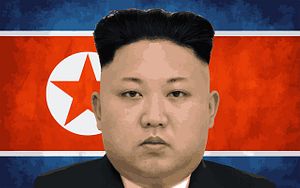All is not well in North Korea. A recent high-level meeting of the country’s ruling Workers’ Party featuring leader Kim Jong Un focused on the less-than-satisfying economic performance of the country over the last few years.
At the 6th Plenary meeting of the 7th Central Committee of the Workers’ Party of Korea (WPK), held last week, Kim underscored the role that “unexpected and inevitable challenges” had played in hampering the country’s economic growth plans. The former referred to the COVID-19 pandemic, which North Korea had earlier this year characterized as a threat to its “national survival,” and more recent natural disaster. The latter, meanwhile, referred to the country’s international isolation as sanctions over its weapons of mass destruction continue to constrain its options.
Kim’s general dissatisfaction is not new or sudden. In recent months, his visits to critical economic facilities around the country have resulted in critical observations. At last week’s plenum, Kim made clear that his assessment of the last five-year economic plan was negative: that the country’s “economy was not improved in the face of the sustaining severe internal and external situations and unexpected manifold challenges.”
Looking forward, the objective appears to be rectification. The 6th Plenary resulted in an important announcement: the Eighth Congress of the WPK will convene in January 2021. Economic growth will remain at the top of the agenda for the Eighth Congress too, with analysis of the “the deviations and shortcomings in the work for the implementation of the decisions made at the 7th Congress of the Party” a priority for Kim and top WPK officials.
The grim assessment shouldn’t necessarily brighten the spirits of sanctions-optimists who remain convinced that additional pressure will cause North Korea to reassess the strategic value of its nuclear weapons. For one, even before COVID-19 and this year’s flooding, Kim had primed the WPK leadership to prepare for more difficult times. After the Hanoi summit in February 2019 fizzled, resulting in no deal, much less sanctions relief, the messaging internally turned toward a theme of: “work hard because sanctions are here to stay.” COVID-19, of course, intensified North Korea’s economic difficulties at the start of this year.
Back in 2018, Kim had set out a “new strategic line,” centering economic development on the national agenda. That came on the back of his November 2017 declaration that the country’s nuclear deterrent had been completed with the testing of three intercontinental-range ballistic missiles and a thermonuclear weapon that year. Underpinning that declaration was a recognition that achieving a credible nuclear deterrent would allow North Korea to focus on economic development on its own terms.
The country’s nuclear deterrent, often described by state media as a “treasured sword,” or “sacred sword,” soon became a “treasured sword of prosperity” in Kim’s report to the 4th Plenary of the 7th Central Committee back in April 2019. The bet was that nuclear weapons would ensure prosperity. That bet has yet to pay off for Kim.

































